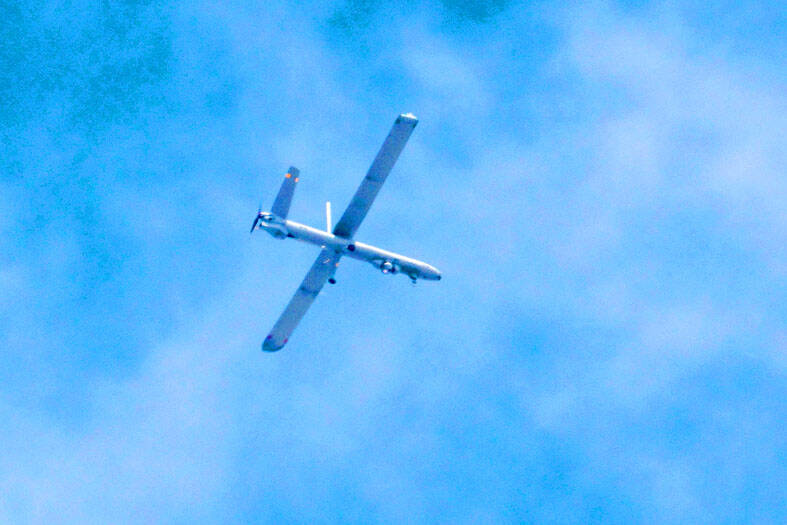The US is imposing sanctions on an international procurement network — including two Taiwanese companies — for supporting Iran’s uncrewed aerial vehicle (UAV) program, the US Department of State said on Thursday.
The sanctions target five entities and one individual based in Taiwan, Iran, China and Hong Kong for procuring technology and equipment to support Iran’s drone development, the department said.
The two Taiwanese companies are Mecatron Machinery Co Ltd (龍馬精機) and Joemars Machinery and Electric Industrial Co Ltd (喬懋機電), which are based in Taichung.

Photo: AFP
“Today’s action supports [US] President [Donald] Trump’s National Security Presidential Memorandum-2 to counter Iran’s aggressive development of missiles and other asymmetric and conventional weapons capabilities,” the department said in a statement.
“The United States will use all available means, including sanctions on entities based in third countries, to expose and disrupt Iran’s schemes to procure equipment and items supporting its UAV program, which destabilizes the Middle East and beyond,” it said.
In a separate statement, the US Department of the Treasury said that the five entities and one individual had procured technology to support Iran Aircraft Manufacturing Industrial Co (HESA), which is sanctioned by the department’s Office of Foreign Assets Control (OFAC).
HESA, a state-owned subsidiary of the Iranian Ministry of Defense and Armed Forces Logistics, manufactures military aircraft and Ababil-series UAVs that have been used by the Islamic Revolutionary Guard Corps, the treasury department said.
Iran-based Control Afzar Tabriz Co Ltd procured computer numerical control machines and equipment for HESA, using Mecatron Machinery and Joemars Machinery to ship them to Iran in a knowing breach of sanctions and export controls, the treasury department said.
Joemars Machinery also established a China-based subsidiary, Changzhou Joemars Industrial Automation Co Ltd, the treasury department added.
All property and interests in property of the designated individuals or entities that are in the US — or in the possession or control of US persons — are frozen and must be reported to the OFAC, the treasury department said.
The treasury department also said that any entity owned 50 percent or more — directly or indirectly — by one or more blocked person is itself considered blocked.
OFAC regulations also generally prohibit US persons, or anyone conducting transactions in or through the US, from dealing with the property or interests of such individuals or entities.
The treasury department added that breaches of US sanctions could result in civil or criminal penalties for both US and foreign individuals and entities.
In Taipei, the Ministry of Economic Affairs said it would urge local companies to comply with international export control laws and step up legal compliance.
It also plans to invite experts to provide training on US export regulations to help Taiwanese machinery firms avoid sanctions.

Nvidia Corp chief executive officer Jensen Huang (黃仁勳) on Monday introduced the company’s latest supercomputer platform, featuring six new chips made by Taiwan Semiconductor Manufacturing Co (TSMC, 台積電), saying that it is now “in full production.” “If Vera Rubin is going to be in time for this year, it must be in production by now, and so, today I can tell you that Vera Rubin is in full production,” Huang said during his keynote speech at CES in Las Vegas. The rollout of six concurrent chips for Vera Rubin — the company’s next-generation artificial intelligence (AI) computing platform — marks a strategic

REVENUE PERFORMANCE: Cloud and network products, and electronic components saw strong increases, while smart consumer electronics and computing products fell Hon Hai Precision Industry Co (鴻海精密) yesterday posted 26.51 percent quarterly growth in revenue for last quarter to NT$2.6 trillion (US$82.44 billion), the strongest on record for the period and above expectations, but the company forecast a slight revenue dip this quarter due to seasonal factors. On an annual basis, revenue last quarter grew 22.07 percent, the company said. Analysts on average estimated about NT$2.4 trillion increase. Hon Hai, which assembles servers for Nvidia Corp and iPhones for Apple Inc, is expanding its capacity in the US, adding artificial intelligence (AI) server production in Wisconsin and Texas, where it operates established campuses. This

US President Donald Trump on Friday blocked US photonics firm HieFo Corp’s US$3 million acquisition of assets in New Jersey-based aerospace and defense specialist Emcore Corp, citing national security and China-related concerns. In an order released by the White House, Trump said HieFo was “controlled by a citizen of the People’s Republic of China” and that its 2024 acquisition of Emcore’s businesses led the US president to believe that it might “take action that threatens to impair the national security of the United States.” The order did not name the person or detail Trump’s concerns. “The Transaction is hereby prohibited,”

Garment maker Makalot Industrial Co (聚陽) yesterday reported lower-than-expected fourth-quarter revenue of NT$7.93 billion (US$251.44 million), down 9.48 percent from NT$8.76 billion a year earlier. On a quarterly basis, revenue fell 10.83 percent from NT$8.89 billion, company data showed. The figure was also lower than market expectations of NT$8.05 billion, according to data compiled by Yuanta Securities Investment and Consulting Co (元大投顧), which had projected NT$8.22 billion. Makalot’s revenue this quarter would likely increase by a mid-teens percentage as the industry is entering its high season, Yuanta said. Overall, Makalot’s revenue last year totaled NT$34.43 billion, down 3.08 percent from its record NT$35.52